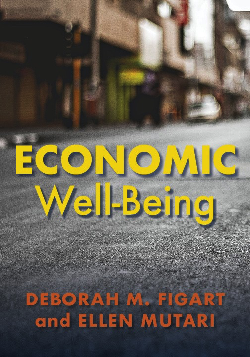
By Paul R. Pace
The NASW Press book, "Economic Well-Being: An Introduction," can help anyone interested in investing in their future well-being, or in taking control of their lives as consumers and workers, say the authors and married couple, Deborah M. Figart and Ellen Mutari.
“While it was explicitly written with human service professionals in mind, it is equally appropriate for anyone seeking to understand economic life,” the authors note.
The book can help prepare social workers to include economic data in program projections and funding proposals, to comment on local public policy initiatives that impact economic well-being, and to appreciate the economic challenges clients face.
The writers are retired from Stockton University in New Jersey. Figart is a distinguished professor emerita of economics, while Mutari is a professor emerita of economics. They say the text was inspired by their students, especially the 1,000 or so students who sat in their economics courses that were specifically targeted to non-economics majors.
“We were also inspired by a community of colleagues and collaborators around the globe who share our commitment to forging a modern, inclusive economics,” the pair said.
The book supports the belief that economy is about people and the purpose of an economy is their well-being. The authors approach economics—not just when teaching social workers but in all their work—with this central insight: “Well-being is the ability to fulfill one’s goals. Our economic lives play a critical role in our ability to achieve our goals.”
A life in which someone has meaningful choices allows them to flourish, the book explains. The availability of jobs; the cost of living; the extent of poverty, income and wealth inequality and economic opportunity; and government policies to address gaps in economic well-being all influence the ability of an individual, family, or community to prosper.
Economic well-being, however, is challenging to measure, they say. A narrow focus on peoples’ material standard of living often shapes economic policy more than the broader idea of well-being.